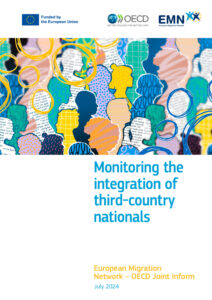This joint EMN-OECD inform presents an overview of policies and state-led practices designed to monitor the integration of third-country nationals and compares relevant national legislation in each EMN Member and Observer Country. Drawing on the contributions from 25 EMN Member and Observer Countries, this inform sheds light on the various dimensions of integration – from education and employment to social inclusion and civic participation.
By comparing relevant national legislation in each EMN Member and Observer Country, this inform highlights the challenges and good practices regarding integration monitoring, focusing on legally residing third-country nationals, including international protection beneficiaries, but excluding asylum seekers and those with rejected protection applications.
The EU is working to integrate a growing number of third-country nationals, who made up about 5.3% of the total population in 2022 with approximately 24 million third-country nationals residing in the EU. According to Eurostat, the number of immigrants from non-EU countries moving to the EU keeps increasing. This is why the integration of third-country nationals is a priority for both national governments and the EU as a whole.
